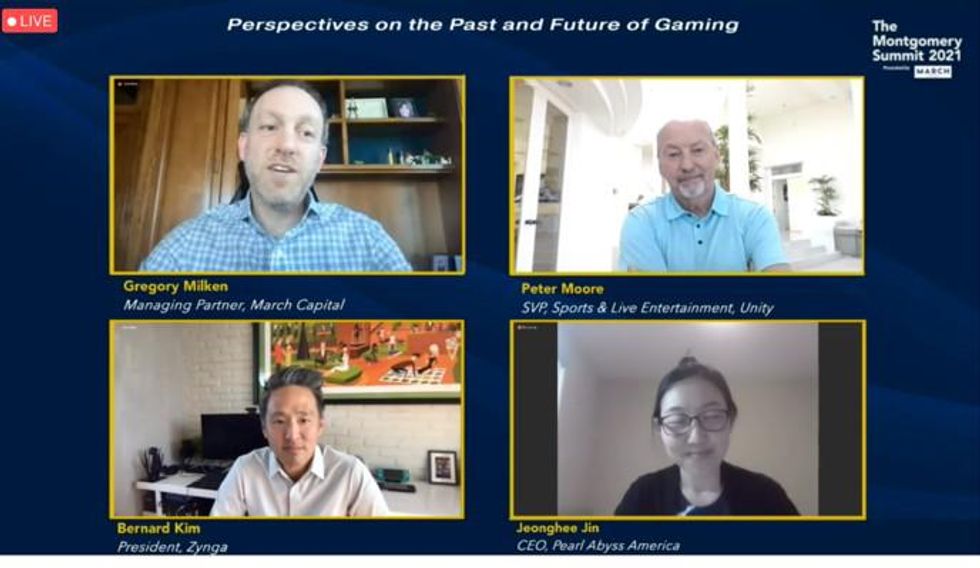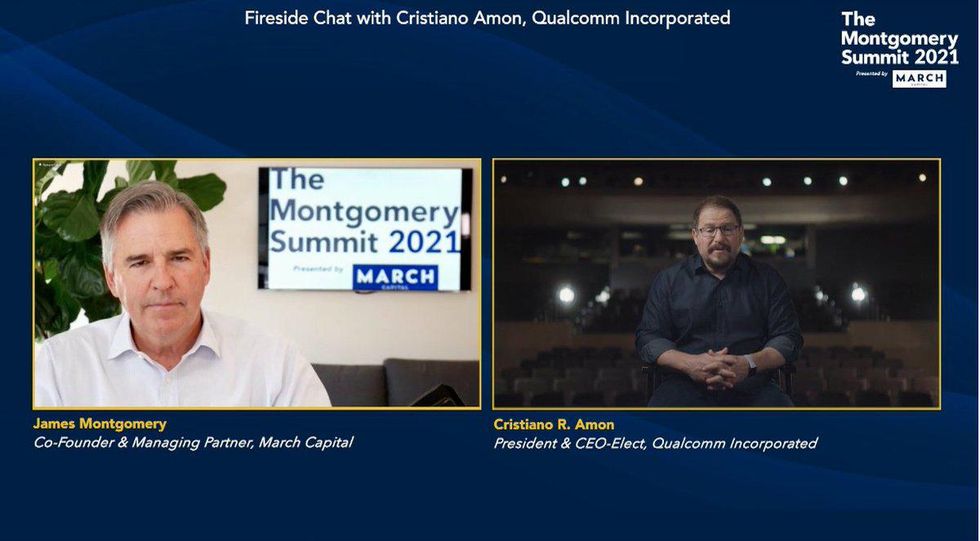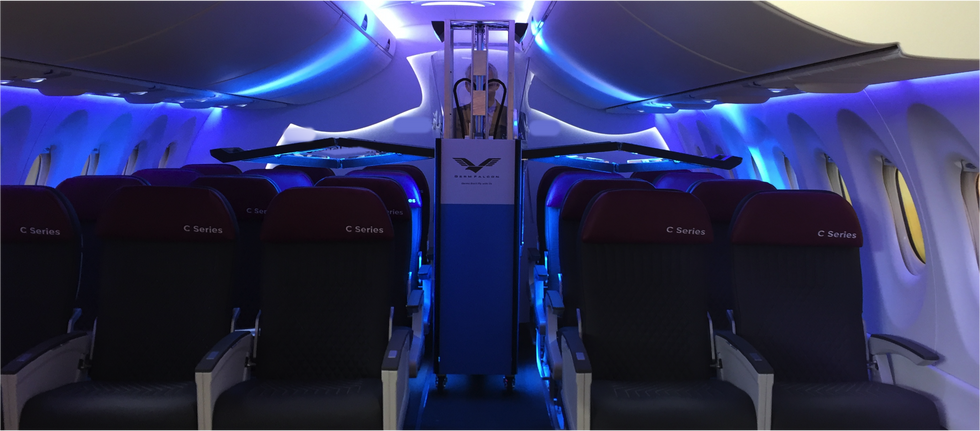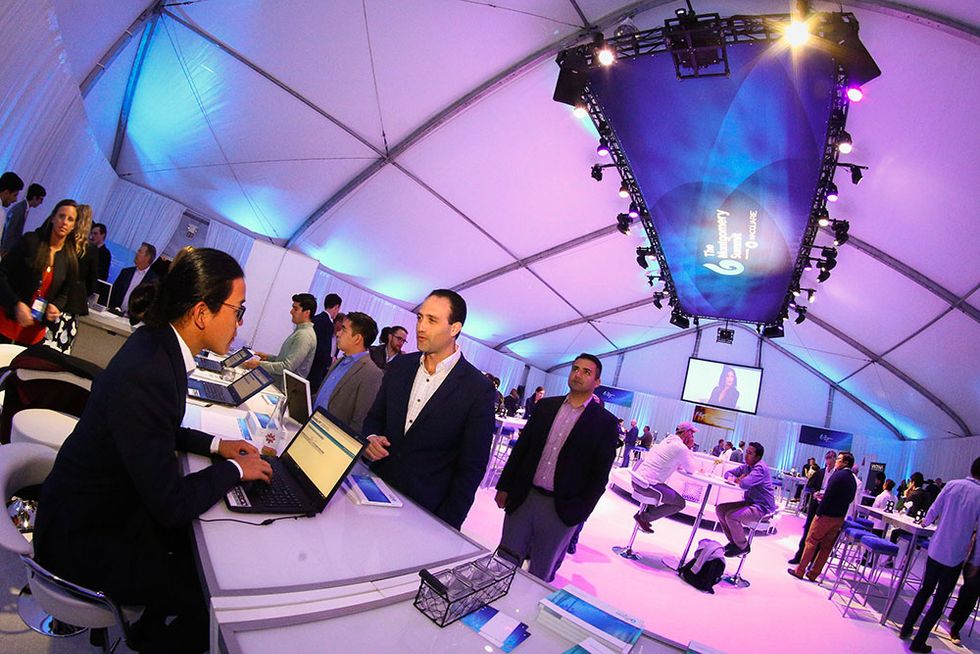Montgomery Summit Updates: Zynga Hunting Gaming Acquisitions; Moxie the Robot Looks to Partner with Schools

This year's Montgomery Summit – held online this year for the first time - features Eric Yuan, CEO & founder of Zoom, author Deepak Chopra, Darius Adamczyk, CEO of Honeywell, and Jim Whitehurst, president of IBM.
There will be about 100 hours of content available exclusive to those who have paid and registered, but, for the first time, 12 hours of plenary sessions will be free for anyone to stream on YouTube, opening panels to a much bigger audience around the world.
See the full agenda here. We'll be watching, and will keep you up to date with takeaways from the conference. Follow updates from the event below and check our Twitter account for more.
Day 2:
- Video Game Maker Zynga On Hunt for Acquisitions
- Maker of Moxie Robot Looks to Raise $50M, Partner with Schools
- Thanks to Pandemic, Incoming Qualcomm CEO Sees 'Golden Era for Telecom
- Glitches: Audio Static Disrupts Cox Enterprise CEO Presentation
Day 1:
- How Peek.com Is Recovering From COVID
- Zoom's Founder Offers Leadership Advice to Startup Execs
- Honeywell CEO Bullish on 2021, M&A Not Slowing Down
- Cybersecurity Spending Is Likely to Grow Amid High-Profile Hacks: Snyk CEO
- How the Montgomery Summit Has Changed for 2021
Video Game-Maker Zynga Is Hunting Acquisitions

Video game-maker Zynga's president, Bernard Kim, said the cash-rich company is on the hunt for acquisitions.
"We have a pretty healthy balance sheet," said Kim, pointing to the $1.5 billion on the books. "We're heavy in the hunt for acquisitions."
San Francisco-based Zynga, which has an office of 20 employees in Culver City, announced earlier this week that it had acquired Echtra Games Inc., a San Francisco-based video game developer. The terms of the deal were not disclosed.
The acquisition is the latest in a string of seven in the past five years, according to Kim. The Echtra purchase continues the company's strategy of growing through deals.
Last month, Zynga pushed further into PCs and consoles with the announcement of its "Star Wars: Hunters" game. The studio is working with developer NaturalMotion Games to release "Star Wars: Hunters" this year for Nintendo Switch, which is a handheld gaming console.
"I guess you can consider us as a consolidator, but it's not really like that. It's really just around expanding the family," said Kim, adding that Zynga has done three acquisitions in the past year during the pandemic.
Zynga has always been in the driver's seat in the video gaming world.
"A lot of companies had counted us out, the industry counted us out, and we sat in a proverbial engine room, and just grinded out questions and like just solved problems," Kim recalled of the game maker's tough times.
Back in 2013, Zynga laid off more than 500 employees — roughly a fifth of its workforce -- and closed offices in Dallas, New York and Los Angeles..
"It all starts snowballing, and we kind of had those moments like, 'Wow, we can't do anything right.' We won this award, —like, the worst company in America — two years in a row, but we emerged from that," he said. "We had these dark moments as a company and now things are kind of snowballing into this positive momentum story."
Kim didn't discuss any potential targets while speaking on a video gaming panel at Thursday's virtually held Montgomery Summit.
"You know, we aren't going to slow down. And that's the really exciting time when things start really moving in the right direction. It could be a really great moment to double down and have more fun."
Maker of Moxie Robot Looks to Raise $50M, Partner with Schools

Paolo Pirjanian, co-founder and CEO of Pasadena-based Embodied Inc., disclosed plans on Thursday that his privately held robot maker business began talks this week to raise an additional $50 million in venture funding.
His company, which makes a robot companion to help kids learn, has raised a total of $44 million from investors including Amazon, Intel, Sony and Toyota.
Pirjanian, a former chief technology officer of iRobot Corp., a Bedford, Mass.-based technology company that designs and builds consumer robots, such as vacuum cleaners and mops, launched Embodied back in 2016.
Embodied's robot companion, called Moxie, can have conversations with kids to help them learn. It is designed to interact with kids and help with social, emotional and cognitive development, while parents connect via an app.
"It's a physical robot that interacts with children in the 5- to 10-year old range, that have been diagnosed with disorders like autism, anxiety, depression, ADHD, and so on," said Pirjanian.
ADHD, or attention deficit hyperactivity disorder, is a chronic condition including attention difficulty, hyperactivity, and impulsiveness.
Pirjanian said that his company plans to explore the use of Moxie with pediatric hospitals, or clinical care facilities for coping with pain and stress. Discussions also are underway with one of the nation's largest school districts to put Moxie in the classroom, Pirjanian said.
"The next big wave is going to be driven by social machine interfaces," said Pirjanian, who made the comments at a panel discussion on innovation in Southern California at the virtually held Montgomery Summit.
Thanks to Pandemic, Incoming Qualcomm CEO Sees 'Golden Era' for Telecom

Cristiano Amon, president and CEO-elect of Qualcomm Inc., a San Diego-based maker of chips and software for wireless technology, thinks we're entering a "new golden era of telecom," fueled partially by a coronavirus pandemic that could accelerate 5G rollouts.
"Telecom kept the world working," said Amon, who is expected to take the helm of Qualcomm in June.
"Without a 5G network, without a 5G infrastructure, none of this is possible. And especially as governments emerge from the pandemic, the importance of prioritizing crucial infrastructure that will be part of the future digital economy of many nations, it is very important for 5G's success," the executive said.
Amon made his comments Thursday at the virtually held Montgomery Summit tech conference.
In telecommunications, 5G is the fifth-generation technology standard for broadband cellular networks, which cellular phone companies began deploying worldwide in 2019. It is the planned successor to the 4G networks which provide connectivity to most current cellphones.
"It is indeed one of the largest opportunities we ever had," said Amon, who noted the resilience of the company's workforce to work remotely during the pandemic, and keep its business humming.
Amon, who climbed the ladder within Qualcomm's chip side of the business, noted that at the height of the pandemic that shut down large chunks of the world last year, roughly 90% of its own workers were at home connected computers on its far-flung tech empire.
"So, we were able to connect all of our labs and people," he said. "What would take the broader society, and I'm speaking from our experience in dealing with 3G or 4G [technology], sometimes it will take about five to 10 years to recognize the benefit and the potential technology that was accomplished in two quarters [of 2020]."
Anon also noted that Qualcomm Ventures, the investment arm of Qualcomm, continues to invest in technologies that transform industries.
"We just put our money where our mouth is, and we look in investing in areas that are going to benefit some of the technology transitions we're very focused on, or also create new industries," he said.
In total, Qualcomm Ventures has invested $1.5 billion and made 360 investments since its launch in 2000. Some of the investments include unicorns like San Jose-based video conferencing firm Zoom, San Francisco-based website security firm Cloudflare, China-based online chat firm Xiaomi and Fitbit, a San Francisco-based consumer electronics and fitness company.
Glitches: Audio Static Disrupts Cox Enterprise CEO Presentation

The Montgomery Summit, one of Southern California's most anticipated tech conferences, got a reminder on Thursday that going virtual isn't as simple as it sounds.
The audio for the fireside chat with Cox Enterprises CEO Alex Taylor went dead after 15 minutes into a half-hour presentation. Technicians attempted to deal with a loud static noise that interrupted the interview.
Several attendees commented on a message board that the static interference was so loud that the conversation was inaudible. Another poster noted that Apple earbuds worn by Tom Giles, Bloomberg executive editor of technology, could have been the culprit.
After the audio was turned off after about 15 minutes into the Taylor chat, operators of the website broadcasting the summit posted a note on the session.
"Due to an audio malfunction, we will share the interview between Alex Taylor and Tom Giles on The Montgomery Summit YouTube page after the conference," the statement read.
Before the audio went silent, Taylor had been discussing a broad number of topics, including Cox's move into cable – its biggest revenue generator – automotive services, and the importance of newspapers, although Cox has shed all of its paper properties.
"I still believe that a newspaper, for whatever the political slant of its editorial pages, is the best source of actual facts, because you have so many levels of editorial judgment going on in that process, and it's hard to get inaccuracies," Taylor observed.
'We Got Punched in the Face': How Peek.com Is Recovering From COVID

Ruzwana Bashir, co-founder and CEO of Peek.com, got off to a good start with her trip-booking company, which is backed by heavyweights Eric Schmidt of Google and Jack Dorsey of Twitter and Square.
A year ago, Peek.com was flying high with $1 billion in bookings. The service lets travelers and locals find and book activities online of via cell phones, including tours, wine tastings, kayaking, helicopter tours, ziplining, horseback riding and lessons of all sorts.
Then COVID-19 hit. Stay-at-home restrictions were imposed throughout the world and domestic travel came to a virtual halt as people sought safety from the pandemic.
"We got punched in the face," Bashir said. "It was a pretty scary time... We did a small layoff. We laid off 30% of our team."
Based in San Francisco, the eight-year-old company has raised roughly $50 million in venture capital funding. But it wasn't certain it would get through the hard times.
Then the summer came, and Peek began seeing a surge in bookings. People were tired of staying indoors and wanted to get out, Bashir explained.
"We are the backbone of these businesses," she added. "It took a level head to get through this, make tough changes. It took a lot of resilience and persistence to get through this."
With the federal government now saying that it could vaccinate all adults by the end of May, Peek.com's Bashir is beginning to see a resurgence in business bookings again this summer. "When we look at the travel space, there is a need," she said. "Campgrounds and RV parks are now even coming in and saying they need our software."
'We've Got to Be Paranoid': Zoom's Founder Offers Leadership Advice to Startup Execs
 macbook pro displaying group of peoplePhoto by Chris Montgomery on Unsplash
macbook pro displaying group of peoplePhoto by Chris Montgomery on UnsplashEric Yuan, president and chairman of Silicon Valley-based Zoom Video Communications, took a break Wednesday from his company's highly touted video conferencing business to deliver some nut-and-bolt tips on executive success and leadership.
Answering questions from former Cisco chief John Chambers, who now runs San Jose-based JC2 Ventures, Yuan noted that his bedside reading has yielded profound success and helped him develop as a leader.
He cited two management and self-help books as key.
They are "Crossing the Chasm," a marketing book written by Geoffrey A. Moore that focuses on the specifics of marketing high tech products during the early start up period; and "Speed of Trust," written by Stephen M.R. Covey that serves as "a guide to business leaders, public figures and their organizations towards unprecedented productivity and satisfaction.
"I read Geoff's book twice," said Yuan, who agreed with Chambers' suggestion that anyone in a startup role should read the book.
But "Speed of Trust," said Yuan, gives startups like Zoom a strong foundation to build on. "At Zoom, a lot of [our employees] work from home, so how do you build trust? It's really hard."
In building a business, founders need to think about the company's "value," he said, as a key facet.
"It's hard to build trust. You need social interaction, but you do that with eye contact. Video is really hard."
Yuan said that building a company takes a lot of time speaking with customers, because they could change their buying decisions quickly. "We've got to be paranoid."
Yuan, who moved from China to the Silicon Valley in the late 1990s, founded Zoom in 2011.
Prior to Zoom, Yuan was corporate vice president of engineering at Cisco, where he was responsible for Cisco's collaboration software development. He was also one of the founding engineers and vice president of engineering at Webex, a video conferencing application.
"My story is pretty straightforward," Yuan said.
Yuan made his comments on the first day of the virtually held Montgomery Summit, one of Southern California's largest gatherings of tech investors and executives of the year.
San Jose-based Zoom, which just two days ago reported profits and revenues for its January quarter that beat Wall Street estimates, raised 2022 guidance to $3.77 billion in revenue, up from $3.53 billion.
Zoom became a household name as the COVID-19 pandemic forced lockdowns across the globe. A steep rise in coronavirus cases during and after the holidays intensified business restrictions and forced many workplaces to reconsider reopening in 2021.
Honeywell CEO Bullish on 2021, M&A Not Slowing Down

Honeywell inked a deal to produce Long Beach-based Dimer's GermFalcon last year.
The pandemic limited some of Honeywell's typical tire-kicking while cutting deals, but the global conglomerate still saw a flurry of recent acquisitions and its CEO Darius Adamczykis is optimistic about a resurgent economy in 2021.
"2021 will be a transitional year, and 2020 was a crisis year," he said.
Among the deals made last year, Honeywell inked a licensing partnership with Long Beach-based Dimer to produce a UV-C light machine, the GermFalcon, that sanitizes airplane cabinets.
"Conditions generally are positive," said Adamczyk, noting that the uptick in "normal" business is expected to swing back noticeably in the second half of the year, coincidentally timed to when Honeywell is expected to open a new corporate headquarters in North Carolina.
Adamczyk said one of his bigger concerns is whether there will be "enough capacity to handle the surge" in growth.
Notably, the $145-billion market-capitalization corporation has made a handful of acquisitions at a time when COVID-19 has limited some of the typical due diligence processes. In fact, M&A activity slowed somewhat last year – though not for Honeywell.
"Acquisitions are more difficult in this environment," he said. "You can't go to facilities and meet with people."
In the case of its Sparta Systems acquisition last month, said Adamczyk, "We knew so much about it. We did a comprehensive due diligence, but we had comfort in buying it."
In December, Honeywell agreed to pay $1.3 billion for New Jersey-based Sparta, an industrial software provider that specializes in life sciences. The deal was the largest acquisition engineered by Adamczyk since he took the helm nearly four years ago. The deal strengthens Honeywell's leadership in industrial automation, digital transformation solutions and enterprise performance management software.
Roughly a week before this deal, Honeywell acquired Sine Group, an Adelaide, Australia-based technology and "software as a service" – or SaaS company -- that provides visitor management, workplace and supply chain solutions that are readily accessible with mobile devices. Terms of the deal were not disclosed.
The company also snapped up several smaller companies last year, including the unit of Ballard Power Systems that makes fuel cells for drones.
"We are building organically, and building inorganically as well," Adamczyk said. "The more digital you are, the better you weather the storm."
Another long-term concern: "What I miss is the water cooler conversation."
Adamczyk said that Honeywell is trying to reach out with connectivity. "It's really important to stay connected."
Cybersecurity Spending Is Likely to Grow Amid High-Profile Hacks: Snyk CEO

Snyk
Photo by Markus Spiske on UnsplashThe headline-grabbing security breaches uncovered in the past year will likely lead to an acceleration of cybersecurity spending, said Peter McKay, CEO of London-based developer security company Snyk.
The lifecycle in cybersecurity spending is at a very early stage, McKay observed during the first day of the virtually held Montgomery Summit, one of Southern California's largest gatherings of tech investors and executives.
"We are maybe two outs in the (bottom of the) second inning," he said. "We are very early on. If talking security, and not thinking shifting left into security development, we'll walk away and come back to talk in six months. We know where they are in their journey," said McKay of the value of waiting for clients to catch up.
McKay cited two high-profile breaches as the catalyst for more cybersecurity spending: Austin-based SolarWinds, which develops security software to monitor databases, and China's Mintegral, which develops mobile operations system applications offered in the Apple app store.
In the Mintegral case, Snyk researchers identified malicious behavior in a software development kit that was present in more than 1,200 iOS mobile operation system applications offered in the Apple App Store.
Snyk estimated that the Mintegral attack – dubbed "SourMint" involved the 1,200 iOS apps that it estimates are downloaded about 300 million times every month. The concern was that the IOS software could harvest URLs accessed through the kit and steal highly sensitive information.
"Once we understood the exposure, we talked to Apple," McKay said. "We automate as much as you can to fix vulnerabilities."
In the other case, SolarWinds provides software to monitor many features of on-premises infrastructure, including network performance, log files, configuration data, storage and servers. SolarWinds sends out regular updates and patches. Hackers were able to infiltrate the update and "trojanize" the software — meaning when customers installed the updates, the malware just went along for the ride.
"This was a paradigm-shifting event," MacKay said. "It brought a lot of attention of building security features into the lifecycle and supply chain."
Snyk's work in the security developer field has been an evolutionary one since it was founded in 2015. Two years ago, SNYK began with technology companies, then financial ones, and then health care and the media fields.
"What you are seeing now are airline or packaging companies, or very low-tech companies, which are in the process of doing a transformation of their business in a secure way. We are bringing best practices to help them make this transformation."
'We Were All Quite Naive': How the Montgomery Summit Has Changed for 2021

When one of Southern California's largest gatherings of tech investors and executives of the year in Southern California begins Wednesday it will be held virtually, just like every other event is these days.
What a difference a year makes.
Last year's Montgomery Summit, also held during the first week of March, brought together hundreds of tech titans to the upscale Fairmont Miramar Hotel & Bungalows in Santa Monica, just as the seriousness of COVID was becoming abundantly clearer every day.
It was the last time many people saw each other in the flesh. Read more >>
- Ben Bergman
- March Capital's Jamie Montgomery on Philanthropy - dot.LA ›
- The Montgomery Summit One Year After COVID Struck - dot.LA ›
- Fist Bumps, Hand Sanitizer and Pitch Sessions at the 2020 ... ›





 Image Source: Blackbird
Image Source: Blackbird